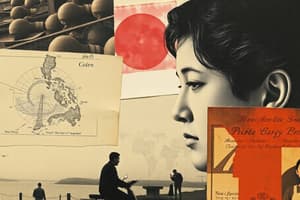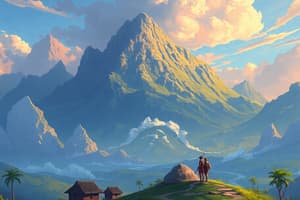Podcast
Questions and Answers
Which aspect of the social world is NOT covered in the Grade 7 Araling Panlipunan course?
Which aspect of the social world is NOT covered in the Grade 7 Araling Panlipunan course?
What is the primary aim of the Grade 7 Araling Panlipunan course?
What is the primary aim of the Grade 7 Araling Panlipunan course?
Which of the following historical periods is often studied first in the Grade 7 curriculum?
Which of the following historical periods is often studied first in the Grade 7 curriculum?
Which geographical aspect is included in the Grade 7 curriculum?
Which geographical aspect is included in the Grade 7 curriculum?
Signup and view all the answers
What type of economic systems are studied in the Grade 7 Araling Panlipunan course?
What type of economic systems are studied in the Grade 7 Araling Panlipunan course?
Signup and view all the answers
Which governance concept is emphasized in the Araling Panlipunan course?
Which governance concept is emphasized in the Araling Panlipunan course?
Signup and view all the answers
Which skill is NOT emphasized in the Grade 7 Araling Panlipunan curriculum?
Which skill is NOT emphasized in the Grade 7 Araling Panlipunan curriculum?
Signup and view all the answers
What is one of the aims of developing research habits in the Araling Panlipunan course?
What is one of the aims of developing research habits in the Araling Panlipunan course?
Signup and view all the answers
Study Notes
Introduction to Araling Panlipunan Grade 7
- Araling Panlipunan, in Grade 7, is an introductory course exploring fundamental social studies concepts, focusing on the Philippines.
- It covers history, geography, economics, and governance.
- The course aims to develop critical thinking, historical understanding, and civic responsibility in students.
Historical Context
- Grade 7 Philippine history begins with precolonial societies and their varied cultures.
- Indigenous groups, their social structures, economies, and traditions are examined.
- Early Spanish colonization and its societal impacts, including new structures, religions, and economic systems, are explored.
- Subsequent independence struggles, including resistance movements, revolutionaries, and key figures, are studied.
Geographical Context
- The course examines the Philippines' archipelago nature, diverse landscapes, and resources.
- The country's Southeast Asian and global location is analyzed.
- Natural resources, climate patterns, and geographic influences on regions are explored.
- Population distribution across the Philippines is a key area of study.
Economic Systems
- Grade 7 Araling Panlipunan introduces various Philippine economic systems.
- Traditional, market, and other approaches are understood.
- Impacts of economic activities on communities and countries are discussed.
- Different economic sectors are examined.
Governance and Citizenship
- Governance structures in the Philippines, historically and presently (colonial, post-colonial, current), are understood.
- Citizens' rights and responsibilities in a democratic society are discussed.
- Functions of local and national government levels are explored.
Social Studies Skills
- Critical thinking and analysis are emphasized.
- Historical interpretation and source evaluation are key objectives.
- Research and study skills development are integral elements.
- Effective written and oral communication of ideas is practiced.
Philippine Culture and Values
- The course explores the rich diversity of Philippine culture and traditions.
- Different ethnic groups and cultural practices are examined.
- Globalization's influence on traditional values and the emergence of contemporary practices is studied.
- Shared Filipino values are highlighted.
Studying That Suits You
Use AI to generate personalized quizzes and flashcards to suit your learning preferences.
Description
This quiz covers the fundamental concepts of Araling Panlipunan for Grade 7 students. It explores the history, geography, economics, and governance of the Philippines, focusing on developing critical thinking and civic responsibility. Key historical events, indigenous cultures, and geographical features will be highlighted.




